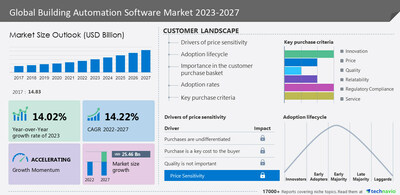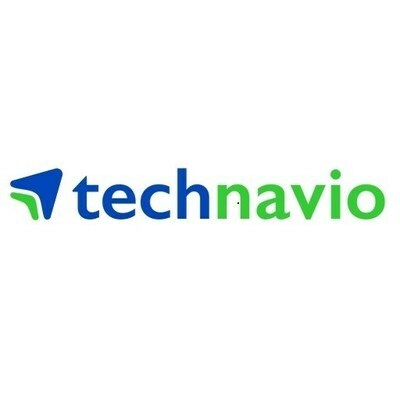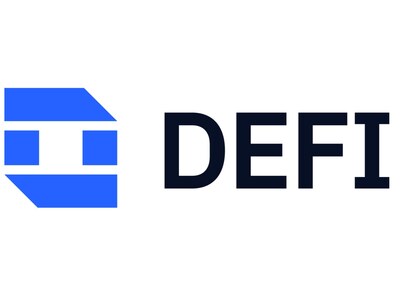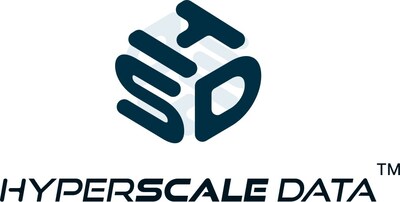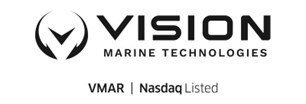Building Automation Software Market size to record USD 25.46 bn growth from 2023-2027, Emergence of customized building automation software is one of the key market trends, Technavio
Press Releases
Apr 18, 2024
NEW YORK, April 18, 2024 /PRNewswire/ — The global building automation software market size is estimated to grow by USD 25.46 bn from 2023 to 2027, according to Technavio. The market is estimated to grow at a CAGR of 14.22% during the forecast period. Building automation software market involves solutions for monitoring safety and security controls in buildings, with vendors incorporating advanced features for improved facility management. Technologies like IoT, renewable energy sources, and predictive maintenance are integrated. TAB System Inc. offers customized automation solutions with Smarti boxes, touch screens, and PLC controllers, focusing on HVAC, lighting, security, and energy efficiency. Key segments include commercial, residential, and industrial buildings, with a focus on interoperability and cloud-based platforms.
To understand more about this market- Download a FREE Sample Report in minutes!
Innovation Sparks Market Growth:
The Building Automation Software Market encompasses advanced systems designed for monitoring safety and security controls in buildings and industrial complexes. HVAC systems, renewable energy sources like solar panels, and IoT integrated systems are key components. Predictive maintenance, centralized control, and energy efficiency measures are prioritized, with IoT technologies enabling real-time data collection from sensors, actuators, and communication modules. Lighting, heating, ventilation, and security systems are optimized for energy savings and improved performance. Smart cities and urban centers benefit from building automation, with applications in waste management, healthcare, education, retail, and more. Interoperability challenges persist, requiring software segment advancements, including cloud-based platforms and artificial intelligence. The commercial segment focuses on offices, retail spaces, hotels, and non-residential buildings, while the residential segment targets smart technologies for access control, video surveillance, and intrusion detection. Building automation systems, control systems, and management systems integrate electric systems for comprehensive facility management. HVAC control, lighting systems, and space utilization are essential features, ensuring optimal building performance.
Addressing Challenges:
The Building Automation Software Market is experiencing significant growth due to the increasing need for energy efficiency and climate change mitigation in the face of zero carbon goals and rapid temperature rises on the terrestrial surface. Smart buildings are integrating various sub-systems, including ventilation, air conditioning (AC), ductless heating, and sanitary guidelines, to ensure optimal energy usage and adherence to regulations. Retail establishments, dining facilities, educational institutions, and consumer AC systems are all adopting these technologies to reduce energy consumption and improve indoor air quality. However, the complexity of integrating existing legacy systems with new software poses challenges, such as compatibility issues and potential security breaches. Smart door locks, wireless intercom devices, and access control systems are essential for security, but they must be integrated seamlessly with other building systems, including fire protection, sound alerts, electrical systems, and lighting control. Government policies and regulations are driving the market, with a focus on energy efficiency, theft and burglary prevention, and fire safety. The integration of these systems is crucial for large cities, where overpopulation and rising temperatures place additional demands on infrastructure.
To understand more about this market- Download a FREE Sample Report in minutes!
Analyst Review
The Building Automation Software Market is experiencing significant growth due to the increasing adoption of advanced technologies in urban centers and intelligent building management systems. These systems encompass various sub-systems such as HVAC, lighting, heating, ventilation, security, and fire detection. The integration of IoT technologies and predictive maintenance capabilities enables centralized control and improved energy efficiency measures. Renewable energy sources, including solar panels, are also being integrated into building automation systems to reduce reliance on traditional electric and mechanical systems. Interoperability challenges persist, however, as various building automation solutions and management systems require seamless communication to optimize performance. The market for building automation software is poised to expand in sectors such as healthcare, waste management, and smart cities, offering opportunities for innovation and cost savings.
Market Overview
The Building Automation Software market is experiencing significant growth due to the increasing demand for energy efficiency and cost savings in commercial and residential buildings. HVAC systems, lighting, and climate control are key areas where Building Automation Software (BAS) plays a crucial role. Renewable energy integration, predictive maintenance, and real-time monitoring are emerging trends in the BAS market. The market is characterized by a competitive landscape with major players such as Johnson Controls, Siemens, Schneider Electric, and Honeywell International. These companies offer comprehensive BAS solutions that cater to various industry verticals, including healthcare, education, and hospitality. The IoT technology is driving innovation in the BAS market, enabling seamless integration of various building systems and providing enhanced functionality and flexibility. The market is expected to continue its growth trajectory in the coming years, driven by the increasing adoption of smart buildings and the need for sustainable energy management solutions.
To understand more about this market- Download a FREE Sample Report in minutes!
Key Companies:
Building Automation Software Market is fragmented; the companies are competing with competitors and are trying to get greater market share. The market is growing, and the chances of new entrants cannot be overlooked. The major companies have well-established economies of scale and market presence and generally rely on positioning technological advances, and the price of the products. Building Automation Software Market report includes information on the product launches, sustainability, and prospects of leading vendors including ABB Ltd., Advantech Co. Ltd., Beckhoff Automation GmbH and Co. KG, BuildingLogiX, Cisco Systems Inc., Delta Electronics Inc., Emerson Electric Co., EUROICC, General Electric Co., Hitachi Ltd., Honeywell International Inc., Ingersoll Rand Inc., Johnson Controls International Plc, Lennox International Inc., Lutron Electronics Co. Inc., Raytheon Technologies Corp., Robert Bosch GmbH, Rockwell Automation Inc., Schneider Electric SE, Siemens AG
Key Topics Covered:
1 Executive Summary
2 Market Landscape
3 Market Sizing
4 Historic Market Size
5 Five Forces Analysis
6 Market Segmentation
7 Customer Landscape
- Product
- BMS Software
- Standalone Building Automation Software
- End-user
- Commercial
- Industrial
- Others
- Geography
- APAC
- Europe
- North America
- South America
- Middle East And Africa
8 Geographic Landscape
9 Drivers, Challenges, and Trends
10 Venodr Landscape
11 Vendor Analysis
12 Appendix
About Technavio
Technavio is a leading global technology research and advisory company. Their research and analysis focuses on emerging market trends and provides actionable insights to help businesses identify market opportunities and develop effective strategies to optimize their market positions.
With over 500 specialized analysts, Technavio’s report library consists of more than 17,000 reports and counting, covering 800 technologies, spanning across 50 countries. Their client base consists of enterprises of all sizes, including more than 100 Fortune 500 companies. This growing client base relies on Technavio’s comprehensive coverage, extensive research, and actionable market insights to identify opportunities in existing and potential markets and assess their competitive positions within changing market scenarios.
Contacts
Technavio Research
Jesse Maida
Media & Marketing Executive
US: +1 844 364 1100
UK: +44 203 893 3200
Email: [email protected]
Website: www.technavio.com/
![]() View original content to download multimedia:https://www.prnewswire.com/news-releases/building-automation-software-market-size-to-record-usd-25-46-bn-growth-from-2023-2027–emergence-of-customized-building-automation-software-is-one-of-the-key-market-trends-technavio-302120348.html
View original content to download multimedia:https://www.prnewswire.com/news-releases/building-automation-software-market-size-to-record-usd-25-46-bn-growth-from-2023-2027–emergence-of-customized-building-automation-software-is-one-of-the-key-market-trends-technavio-302120348.html
SOURCE Technavio


